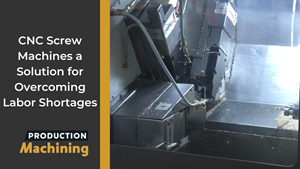New Thinking from the New Generation for the New Year
“We have to learn to think in a new way.” –Albert Einstein
Rather than inaugurate this year with a list of resolutions or prognostications that may or may not be of interest or value, I’d like to share some of the new thinking from the new generation of industry leaders that I have encountered over the past year. Trigger warning: if you are a fan of continuous improvement, this article’s message may be a bit unexpected.

Max Kocher, production manager of grinding at Paul Horn.
Photo Credit: Paul Horn
Incremental Improvement
I met Max Kocher, production manager of grinding at Paul Horn, while visiting Horn Technology Days, and was impressed by the aspirations that were built into his thinking. Max is a convincingly positive ambassador for the company’s commitment to culture and craft, but shocked me when he spoke dismissively of continuous improvement. Here is what he said: “Incremental improvement is insufficient for the future that we intend.”
As a practitioner and leader of continuous improvement, I found it humbling to find that my incremental improvement philosophy had suddenly become “insufficient” in the eyes and mind of this new-generation production manager.
Incremental, continuous improvement has been my daily experience and top priority in manufacturing — and life — since being separated from U.S. Steel in 1984, when the domestic steel mills were losing the quality battle against foreign mills. Continuous improvement and statistical and quality tools helped us to win back that business and create processes operating at zero parts per million across multiple years for our automotive production processes. Continuous improvement was sufficient for me.
Max quotes Wolfgang Grupp CEO at Trigema to explain. “Mr. Grupp says, ‘If you have a big problem, you are an idiot. Every big problem was once a small problem. Fix it when it’s small.’”
This is puzzling. Fixing it when it is small sounds a lot like incremental improvement to me. But Max explains that small problems should not even be tolerated — they should be eradicated, not incrementally improved.
Root causes should be identified and eliminated. No incremental improvement bandages. Intolerance for insufficient processes. Confronting and eliminating them. Eliminating small problems is not incremental improvement in this worldview. It is a professional obligation.
This view does not exactly match my mental model of incremental improvement. Does it match yours?
Wouldn’t we be happy to reduce the impact of a small problem in our process, even if we had not eliminated it? Incremental, continuous improvement, right? Not so.
Max and his mentor are giving us a new value: intolerance for process failures. I will embrace my ‘intolerance’ in this new year. Will you join me?
But Wait, There’s More
Max’s vision also evidences a recalibration of our motivation and intention, “…is insufficient for the future we intend.” Give that a few minutes of thought. “The future we intend.” What is the role of intention in our manufacturing practice? With serious reflection, one can get fairly easily to the idea that they intend to make good parts. That they intend to not cause waste or excess scrap. That they intend to identify some improvements to reduce costs and help sustain the business as a commercial enterprise.
These ideas do not sound like they are anywhere near the “future that we intend” vision that Max has shared.
What Does That Future Look Like?

Markus Horn, CEO of Paul Horn.
Photo Credit: Paul Horn
Here is a glimpse of the Horn view — of the present — from CEO Markus Horn, “We will continue to develop and master the tools needed embrace the technological advancements and new developments in physics that will shape the future… of the world.”
Embrace technological advancements and new developments in physics — nothing is incremental in these words.
These words show a vision that is far more ambitious than a mere “better tomorrow than it was today” worldview. These words evidence a commitment to mastery — not only of our culture, craft, and processes, but a commitment to challenge the very limits of our scientific knowledge that we might provide; not better products for our customers to buy, but better solutions to our customers’ problems. Solutions that might not even resemble our current product offerings.
What is the Future That You Intend?
Is it just like today, only a little bit better? That was my thinking until my conversation with Max and with Markus. Until I met this new generation and considered their thinking. Thank you, Max and Markus, for challenging me to reconsider, “What is exactly the future that I intend?” Our approach needs to be a much more aggressive vision of what must and needs to be done, if it is to be worthy of our investment, time, and attention.
What is the future that you intend? Will you get there, a single step at a time? Tradition suggests yes. But this new generation is showing us that those steps need not be incremental, nor baby steps. Perhaps, we need to take a few leaps as well. Happy New Year, 2024.
What is the future that you intend?
About the Author
Miles Free III
Miles Free III is the PMPA Director of Industry Affairs with over 50 years of experience in the areas of manufacturing, quality and steelmaking. Miles’ podcast is at pmpa.org/podcast.
Email: mfree@pmpa.org — Website: pmpa.org.
Related Content
Gift a 3D Printer to an Employee?
Some shops have purchased inexpensive polymer 3D printers for their operations. Does it make sense to take this a step further and give (or loan) a sharp young employee one to experiment with at home? This small investment could pay off for your shop in different ways.
Read MoreVideo Tech Brief: CNC Screw Machines a Solution for Overcoming Labor Shortages
CNC screw machines can exceed job shop productivity and enable manufacturers to overcome perpetual employment gaps.
Read MoreSuccession Planning: Three 15-Minute Activities to Start Preparing for Tomorrow
Succession planning is planning for the future success of your business.
Read MoreRecognizing Signs of a Degrading Workplace Culture
Is your machine shop missing key “culture elements?” Here are ways to identify if your organization is heading in the right or wrong direction in terms of establishing a healthy company culture.
Read MoreRead Next
A Tooling Workshop Worth a Visit
Marubeni Citizen-Cincom’s tooling and accessory workshop offers a chance to learn more about ancillary devices that can boost machining efficiency and capability.
Read More5 Aspects of PMTS I Appreciate
The three-day edition of the 2025 Precision Machining Technology Show kicks off at the start of April. I’ll be there, and here are some reasons why.
Read MoreDo You Have Single Points of Failure?
Plans need to be in place before a catastrophic event occurs.
Read More














.jpg;maxWidth=300;quality=90)







